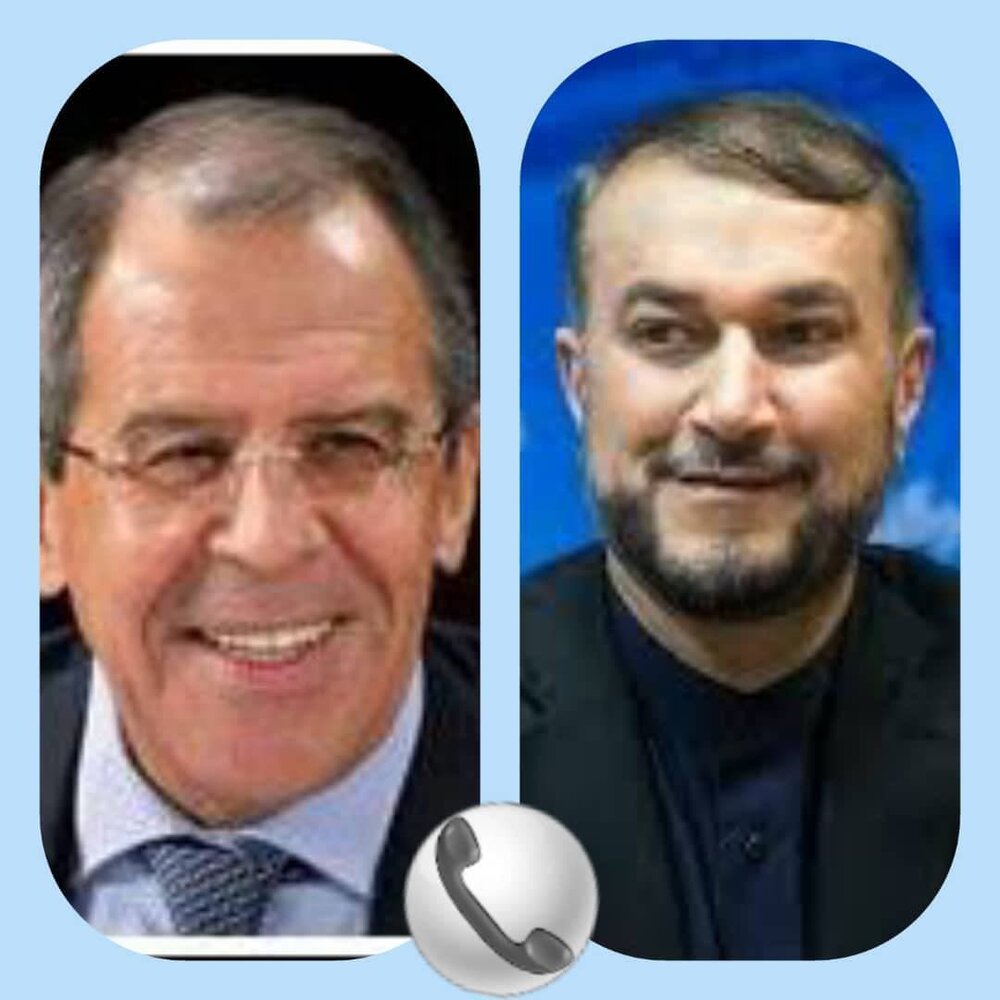Iran, Russia FMs discuss Vienna talks

TEHRAN – The foreign ministers of Iran and Russia have spoken over the phone on Monday to discuss the latest developments in the ongoing Vienna talks.
Iranian Foreign Minister Hossein Amir Abdollahian and the Russian Federation's Foreign Minister Sergey Lavrov exchanged views on the latest status of the Vienna talks.
In the telephone conversation, Amir Abdollahian explained Iran's position and called on the West to be as serious as possible and urging the involved parties to come up with initiatives in the negotiations, the Iranian foreign ministry said.
The Russian foreign minister described the Iranian deputy foreign minister's visit to Moscow as positive, saying the two countries' delegations are seriously cooperating on the steps to be taken by the two sides and their implementation arrangements in Vienna.
Lavrov noted that it has always been emphasized that all sanctions which are illegal and contrary to the Joint Comprehensive Plan of Action and UN Security Council Resolution 2231 should be removed. He added that Moscow has always tried to bring the Americans in line with all the rules of the JCPOA and UN Security Council resolution 2231.
The Russian foreign minister called the constructiveness and diplomatic creativity of the parties, along with patience for further coordination, the key to the success of this stage of the negotiations for the parties.
The Russian Foreign Ministry said in a statement that the two chief diplomats focused in their conversation on “vital issues related to the Joint Comprehensive Plan of Action and Iran’s nuclear program in the context of the resumption of the negotiating process in Vienna” on November 29.
“Both parties affirmed the common determination to revive the nuclear deal in its original, balanced form, which was endorsed by the United Nations Security Council,” the statement said, according to Press TV.
Lavrov and Amir Abdollahian, as the statement said, underlined that “this is the only correct way to ensure that the rights and interests of all parties participating in the comprehensive agreements are taken care of.”
Also, the Iranian foreign minister exchanged views with the foreign minister of Oman, Badr bin Hamad Al-Busaidi.
Amir Abdollahian referred to the nuclear talks and underlined the Islamic Republic's readiness to reach a good deal to fully enjoy the economic benefits of the 2015 nuclear deal and also dispel the possible concerns of the other side.
He said Iran's nuclear program will also be pursued in line with the nuclear deal in exchange for removal of sanctions.
Oman's top diplomat also referred to his country's support for the nuclear talks during the phone call. Busaidi said Iran's emphasis on its seriousness and efforts to conclude the talks is a cause for optimism and Oman always holds consultations in this regard.
The phone conversations came at a time when the Vienna talks are making progress slowly. This was evident from remarks by several Russian diplomats.
Russian Deputy Foreign Minister Sergei Ryabkov has said the chances of reaching an agreement on restoring the 2015 nuclear deal, officially known as the Joint Comprehensive Plan of Action (JCPOA), have increased.
“I think that now, the likelihood that we will come to an agreement has increased compared to what it was before the resumption of negotiations. I would rather say that there are reasons to expect some progress, not fast but at least clear, without any kickbacks and additional factors that can complicate [the situation],” Ryabkov told Sputnik.
Aside from this, the proposals put forward by Iran at the Vienna talks on the JCPOA, according to Ryabkov, demonstrate Tehran's utmost seriousness about restoring the nuclear deal.
“There are other proposals presented not only by Iran. Negotiations are for finding a common denominator. It is not hopeless. On the contrary, there is material for consideration. As for the Iranian proposals, I can only say one thing — they have demonstrated the utmost seriousness of their approach to the task,” Ryabkov said.
At the same time, the deputy foreign minister noted that it is counterproductive to threaten Iran with sanctions against the backdrop of the nuclear talks in Vienna - something the U.S. is doing.
“This is their usual method — trying to drive someone to heaven with sticks. We constantly explain to the Americans the counterproductivity of this approach,” Ryabkov said.
Iran has expressed its readiness to reach a good deal based on the terms of the original JCPOA.
In a recent Instagram post, Amir Abdollahian said that the Iranian negotiating team is in the Austrian capital to reach a good deal.
“We are all in Vienna to negotiate to reach a good agreement. The Western parties should know that in the last eight years, enough has been said and they made promises that were never fulfilled, but today is the time to act and we are working to reach a serious and good agreement,” he said.
He added, “Iran's nuclear program is entirely peaceful, but resolving the alleged concerns of the Western parties is directly linked to the complete removal of sanctions.
Although we are doubtful whether the West is basically ready to lift the sanctions or only seeks to resolve its concerns in a one-sided manner, if the West takes part in the negotiations ahead with good intentions, initiative and constructive ideas, we will certainly see quick progress in the negotiations.”
But Iran’s seriousness was met with Western apathy. Ever since the resumption of the Vienna talks nearly two weeks ago, the U.S. has done everything in its power to blame Iran for the manufactured failure of the talks. Before the new round of talks, the Americans and their European allies launched an early blame game which continues to this day.
They accused Iran of not being serious and, and even worse, playing for time to build up its nuclear infrastructure.
Leave a Comment